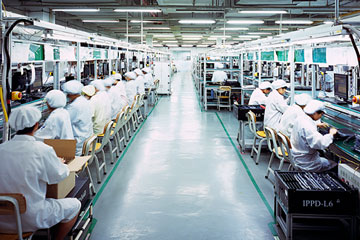
A Foxconn plant in Shenzhen, which puts together, among other products, the iPhone.
Is China an unbeatable industrial juggernaut that will steamroll the U.S., stealing our jobs and depressing our wages in its relentless quest for wealth and power?
Or is it the world's biggest opportunity for U.S. corporations, a honeypot that will enrich our firms and make us more prosperous as a result? Those are arguably the two biggest questions in the global economy right now. With the U.S. growing at a sluggish 2.5% and Europe doing even worse, all eyes are on China as the world's growth engine. In the mere 30 years since its communist leadership exchanged Maoist rhetoric for good old capitalism--or what it calls "socialism with Chinese characteristics"--China has become the world's second largest economy and the chief rival of the U.S. for global dominance. China's 1.3 billion upwardly mobile people are voracious consumers of everything from cars to smartphones to Kentucky Fried Chicken. Through its relentless exports, China has amassed a mountain of cash reserves and made itself Washington's biggest foreign creditor.
However, the country that vacuumed up factories to become the Workshop of the World is fading into history. China is a victim of its own success. Decades of nonstop growth have forever altered its place in the global economy and changed how it must compete with rich nations like the U.S. and emerging economies like India. The tools that China has used to spark its economic miracle--government support, cheap labor, state-directed finance--cannot ensure its future. The country can no longer rely on just making lots of stuff; China has to invent things, design them, brand them and market them. Instead of following the leaders of global industry, China has to produce leaders of its own.
Such a transition is not easy. Few emerging nations in modern times have made the leap from assembler to inventor, copycat to innovator. For China, this would mean an overhaul of its economy. Many of the products China manufactures today aren't really Chinese at all. Apple iPads might be exported from assembly lines based in China, but the Chinese themselves do little more than piece them together. The core technologies come from elsewhere, and even the factories are run by foreign firms (like Taiwan's Foxconn). For Chinese companies to compete with the world's best, they will have to create products of their own that have an impact similar to the iPad's. That requires a set of skills and know-how they don't yet possess and a level of managerial expertise they haven't yet developed. Economist William Janeway, author of the book Doing Capitalism in the Innovation Economy, says what has gotten China this far won't be enough for the next step: "It is hard to start the process of pushing the frontier with [such] practices and policies."
